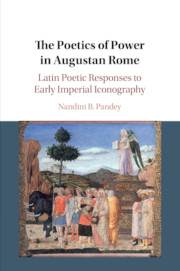Book contents
- The Poetics of Power in Augustan Rome
- The Poetics of Power in Augustan Rome
- Copyright page
- Dedication
- Contents
- Illustrations
- Acknowledgments
- Chapter 1 The Mutual Constitution of Augustus
- Chapter 2 History in Light of the Sidus Iulium
- Chapter 3 Questioning Consensus on the Palatine
- Chapter 4 Remapping the Forum Augustum
- Chapter 5 The Triumph of the Imagination
- Chapter 6 The Last Word?
- Bibliography
- General Index
- Index Locorum
Chapter 3 - Questioning Consensus on the Palatine
Published online by Cambridge University Press: 18 September 2018
- The Poetics of Power in Augustan Rome
- The Poetics of Power in Augustan Rome
- Copyright page
- Dedication
- Contents
- Illustrations
- Acknowledgments
- Chapter 1 The Mutual Constitution of Augustus
- Chapter 2 History in Light of the Sidus Iulium
- Chapter 3 Questioning Consensus on the Palatine
- Chapter 4 Remapping the Forum Augustum
- Chapter 5 The Triumph of the Imagination
- Chapter 6 The Last Word?
- Bibliography
- General Index
- Index Locorum
Summary
- Type
- Chapter
- Information
- The Poetics of Power in Augustan RomeLatin Poetic Responses to Early Imperial Iconography, pp. 83 - 141Publisher: Cambridge University PressPrint publication year: 2018



